News and views from Divakar S Natarajan's, "no excuses", ultra peaceful, non partisan, individual sathyagraha against corruption and for the idea of the rule of law in India. Now in its third decade.
Search This Blog
Sunday, March 29, 2009
How My Water Supply Was Disconnected Since April 5,2002
Kanti Rajan,
109, Mount Santoshi Apartments,
Mayuri Marg, Begumpet 500 016.
Tel: 776 15 79. April 5, 2002
The Commissioner of Police,
Hyderabad A.P.
Sub: Collusion of Inspector, Begumpet Police Station with criminal vigilante behaviour of so-called Mount Santoshi Apartments Owners Association.
Sir,
I am a former teacher of the Hyderabad Public School, Begumpet, who after 20 years of impeccable service, founded a pioneering Early Childhood Education Centre which is rendering sterling service to young parents of the twin cities, since the past six years.(Re:Appendices)
My father is one of the first actuaries that India produced and he retired as an Executive Director of the Life Insurance Corporation. He is also a holder of the Tamra Patra since was arrested during our country”s freedom struggle. I am proud to state I come from a family has rendered excellent service to society in areas as varied as classical Indian music, to Himalayan mountaineering.
I have lived in apartments for a large portion of my life in Bombay, where several Bharat Ratnas and other eminent personalities have visited our home and where we were also neighbours and friends to the illustrious Mangeshkars, especially our beloved Lataji.
My son Shri Divakar S Natarajan, is an eminent film maker whose documentary “Hyderabad. August 1948” has been nationally acknowledged as succeeding in creating a feeling of “revulsion against waste caused by violence and irrationality”. His film is credited with having revivified the national memory of the heroism of Shoebullah Khan and other brave Muslims who risked their lives and reputations to stand up to the mob hysteria and pathological conformism of those times in order to lead people on a constructive path.
Shri Divakar’s work and his effective contribution for the cause of cyclone relief has also been warmly acknowledged by our Hon’ble Chief Minister.
Several other eminent personalities, including former Home Minister Shri Indrajit Gupta and Padma Vibhushan Kaloji Narayana Rao have also testified to Shri Divakar’s decade long,individual, non political satyagraha against corruption.(Re: Appendices)
Sir, I have had to provide you with the above lengthy introduction, not with a view to gain any special consideration – the criminality of our neighbours’ vigilante action is clearly evidenced by their own “notice” - in reality, a threat and defamation - but to provide a compelling context to the utter irrationality, violence and the ultimate self-destructive nature of their actions – this seen in the larger context of a great, traumatized nation, struggling to fulfill its potential.
This larger context is necessary, for in the unabating, irrational, unprovoked venality and hatred of a few of our “well educated” neighbours, their raging power lust even in as trivial and personal a matter as the running of a apartment maintenance society, in the dumb acquiescence of others, in their practiced penchant for using the law without any respect for its tenets and in the aggressive collusion of officers of the law in this mob criminality, I see in microcosm, the pathologies of, what I would call the “old ways” that have horrified, shamed, stunted and leeched our self perception and self confidence from the times of Partition to now in burning Gujarat.
My family and I have always conducted ourselves in the “new way”. We have invested our creative energies, and unfortunately suffered some pain, loss and humiliation, because of our limitless faith in the tenets and values of a democracy – respect for the dignity and autonomy of the individual, checks and balances, rule of law and due process. Because despite all the dismal and horrifying evidence, we believe, this is the only way , the only discipline, through we will achieve and develop our full human potential as citizens and emerge as a great and productive nation.
The Case.
Around 12.30pm yesterday,fourth April, my grand daughter, who is very busy studying for her crucial 12th standars examinations and a few Common Entrance Tests, heards the sound of somebody hammering against the kitchen wall. She found the Shri G Anandam ,President of the society in the company of Shri Chawla another resident , directing a plumber to break our water line. She alerted my son, who warned them of the criminality of their assault and requested them to take recourse to the proper judicial process to make their case. Since, they did not stop, my son appealed to the plumber, asking him , “If somebody pays you money to hit somebody, will you do it ?”
The plumber realized he seriousness of the situation and stopped. But he was being hectored and threatened by the others. My son now called the Begumpet police station , but was advised to wait till 4pm, since there was nobody at the station. Apparently most of the men had been called for bandobust for the visiting Indonesian President.
Undeterred my son called your office, and was given a polite hearing, immediately thereafter a jeep load of policemen, headed by the sub inspector, came to the house, conducting themselves with exquisite and inspiring courtesy, they surveyed the damage read the incriminating notice, agreed that there was no justification for anybody to take the law into their own hands and finally advised my son to give a written complaint at the police station, which my son agreed to do.
Seeing the police arriving in strength, both Shri Anandam and Shri Chawla made themselves scarce. My son decided not to press the issue at that point.
However, in the evening my son noticed that the water supply to the flat that commences at 5.30 pm was not commencing.
At this time he called the Inspector at the Begumpet police station, who rudely told him to “co operate “ with the Association, he mentioned that he had received a complaint from the Association three days earlier, and advised my son to pay up the spurious “dues” allegedly owed by me.
My son now called the ACP , Begumpet and was given a polite hearing. The ACP asked him to speak to the Inspector after a delay of a few minutes.
However, my son was not optimistic of a better response, given the earlier definite and prejudiced reaction of the inspector, and so called your office for help. Given the urgency of the situation , he was advised to meet the ACP personally. However, the ACPs tone had changed. The ACP was rude and provocative, confirmed that the Inspector had received a prior notice of intended criminal activity from the Association. He too advised my son to “cooperate”. He refused to give my son a proper hearing.
He also threatened that if we did not heed the ACPs advice, we would no longer be able to live in our apartment. I must mention that this is my own flat purchased from my own savings and income.
Also till the time of writing this complaint, 10.30 am of 5th April, there is no water supply to our flat.
Background.
Sir, I am deeply saddened, this so called “notice’ issued by the Association, is the first irrefutable evidence their ten year long campaign of hatred against me and my family.
This is because in my own interest as a flat owner and also in accordance to my beliefs, I have attempted to take an active part in the Association and have strenuously objected to the uncouth ways of some of its members. I have also sought to to discuss, some of the several malfeasances of the Association.
Since my participation was proving counterproductive, I have had no option but to dissociate myself from its activities however, I continued to pay the maintenance fees. Since even this was raised to an exorbitant amount, I stopped doing so. I had no choice.
In the meanwhile , a coterie has formed, that has sought to, ostracize us and has used every opportunity to vilify , defame and humiliate us. Some of the members have even threatened my son’s life.
However, since we have had little irrefutable evidence, and it was our word against some other ethically confused neighbours, we have had no choice but to put up with this humiliation.
Inferences:
* The Association’s contempt and lack of confidence in the due process of the law is clearly evidenced by its circular and its threatened action. Lacking any legal sanction , the Association’s action can only be characterized as uncivil,’mob’ action.
* By his own admission, the Inspector, Begumpet police station , had received notice of the Association’s intentions. It is unclear why the Inspector took cognizance of a civil matter.
* Even afterwards he did not make any attempt to ascertain my side of the matter. He even appears to have accepted the spurious claim of Rs 26,150/- made by the Association and has urged my son to pay up or face the consequences.
* Unfortunately, the ACP also, contradicted himself and merely mirrored his subordinate’ s illegal position and threatened my son .
Sir, given the dismal and horrifying news that appears in the press day after day, and given our own active and constructive lives , I am constrained to view the incidents narrated above with the utmost gravity.
As such I urge you to take forceful action under the law, so as to nip any unfortunate consequences in the bud.
Immediately, I would like my water supply restored, and Association educated about following the due process of the law.
Sincerely,
Kanti Rajan, MA B Ed.
The Value Of "Hyderabad, August 1948." - a disinterested, historical view.
By Anil Nauriya
Since many of the contrary voices, like those of Allah Baksh, represented the unifying tendency within India, their muffling has fed Hindutva.
SOON AFTER the assassination of the legendary Allah Baksh on May 14, 1943, a young Sikh in Lahore wrote an elementary biography of the murdered leader. The first part of the title of the book by Jagat Singh Bright was "India's Nationalist No 1". Today, 60 years after the killing, India barely remembers Allah Baksh and his resounding challenge to Muslim separatism through the Independent (or Azad) Muslims Conference that this Sind Premier organized in Delhi in April 1940, a month after the Muslim League passed its Partition resolution at Lahore. The Conference, presided over by Allah Baksh, shook up the British establishment.
Azad wrote: "The session was so impressive that even the British and the Anglo-Indian press, which normally tried to belittle the importance of nationalist Muslims, could not ignore it. They were compelled to acknowledge that this Conference proved that nationalist Muslims were not a negligible factor". This all-India Conference, which Nehru described in his `The Discovery of India' as "very representative and very successful" is today a forgotten event. The man who organised it may not even have existed so far as most of our historians are concerned. Instead, the portrait of V.D. Savarkar, who denied Indian nationalism in order to assert Hindu nationalism, hangs in the Central Hall of Parliament. Serious questions arise about contemporary political parties, including the Congress. What makes it possible for persons essentially opposed to its ideals to make a home in and flourish in the Congress, especially in the post-1969 years? There are both political and intellectual roots to this crisis. There was a time when it was the Congress which influenced its allies. Allah Baksh was not in the Congress. But his Ittehad or United Party in Sind was a close ally sympathetic to Congress programmes. His letter to the Viceroy after the Quit India Movement of 1942, protesting against Churchill's speech in the British Parliament, and returning his titles, was remembered even till the 1960s as one of the classic documents of Indian freedom. Gandhi and Nehru were in prison at the time. Subhas Bose went on radio to compliment Allah Baksh. As a result of Allah Baksh's letter he was dismissed from the Premiership of Sind even though he still had a majority in the Assembly. Ultimately, he lost his life upholding the concept of Indian nationalism.
Congress ideological alliances in recent decades are merely alliances to protect its electoral, legislative and parliamentary positions. The ideological factor is missing. The doyen of the Indian socialist movement, Acharya Narendra Deva, had anticipated this when he once chided the Congress for opening its doors to former members of the RSS and the Muslim League. The Jana Sangh and then the BJP alliances have also had electoral and legislative objects. But the Hindutva organisations have taken care to protect and even strengthen their ideological position as well. The recent BJP alliance with the BSP in Uttar Pradesh is being resented by saffron cadres precisely on the ground that a blank cheque has been given to Mayawati.
Alliances are necessary and are often made in politics. But if alliances made between a tradition that led the struggle for freedom and other traditions result in erasure of vital ideological positions this cannot but have consequences for the country. When Indira Gandhi's Congress faction came together with the CPI after 1969 the Union Education Ministry presently went to Nurul Hasan. Historiography was placed largely in the hands of well-intentioned but uni-dimensional historians analytically oriented towards the pre-independence CPI. The Congress-CPI alliance was probably necessary. But its impact on the intellectual front was not well worked out by the two sides and was skewed. These historians wrote in an age when they were tempted to assume that the Congress dominance would be there forever or, if replaced, would be replaced only by a formation in which the Left would play a major role. They, therefore, concerned themselves primarily with the vindication of the pre-Independence CPI, or variations upon this theme. Congress, including socialist, history — for example, the Congress and Congress Socialist role in creating and advancing the all-India peasant movements — went by default. Political training for Indian nationalism was neglected.
The Congress as an organisation hardly took note of what was happening with its own support. Today the effects of this can be noticed in the cultural sphere as well. Urdu poets like Saghar Nizami who stood up for India in the 1940s are largely forgotten. Other poets who backed sectarian movements are considered definitionally and pre-emptively progressive by virtue of their membership of the Progressive Writers' Association. Similarly, after 1989 when the Congress justly incorporated Ambedkar also into its ideological pantheon, it so forgot itself that famous Dalit leaders such as Juglal Chaudhury and Chaudhri Beharilal who had supported the Congress since the Non-Cooperation Movement of 1920 and who had repeatedly been imprisoned in the freedom movement were largely eliminated from national historical memory. While the Congress has been willing, even if by default, to erase its ideological heritage, the BJP has throughout not only protected its own but has also sought to build up a basis for it, albeit often a synthetic one.
In the 1970s and 1980s, Hamza Alavi circulated a paper seeking to furnish an explanation of the Pakistan movement as one reflecting primarily the perceptions and interests of "Muslim professionals and the salariat" of northern India. The thesis had an appreciable circulation. If scrutinised closely, it gives rise to several questions. From the point of view of the Muslims in India, their chief concerns apart from security of life and property, remain education and employment. So if the Alavi thesis were accepted, the Pakistan movement in northern India failed to solve the very problem for which it had received support in the 1940s.
Anglocentric writings, which were tied to British foreign policy and strategic objectives and continued to exercise influence in the South Asian former colonies, suffered from a dichotomy with respect to Indian nationalism. They critiqued Indian nationalism. But they did not adequately critique the Muslim separatism which evolved into Pakistani nationalism. The result was that most dissidents or opponents of Indian nationalism were glorified, while the Muslim opponents of Muslim separatism and of Pakistani nationalism were barely mentioned. These contrary voices, like those represented by Allah Baksh, were sought to be silenced, as were the subaltern and artisan voices among the Muslims. This was although the doubts expressed through these voices stood vindicated by history so far as the interests of Muslims within post-Partition India were concerned. These voices have also acquired a renewed resonance in the context of prospects for enhanced cooperation within South Asia. Indian scholarship, however, largely failed to challenge the Anglocentric dichotomy. This was partly because the dominant scholarship in India since the 1970s, being overly self-conscious about the specific line which the CPI took on Pakistan in the 1940s, could not decide whether to challenge or to reinforce the Anglocentric dichotomy. Even when it discussed these voices it could portray them only as victims of Indian nationalism. There were outstanding exceptions. Santimoy Ray's `Freedom Movement And Indian Muslims', published by People's Publishing House in 1979, had presented the relevant facts not only on this but also on considerable subaltern involvement in the national movement since 1919. But this work was not followed up in the same spirit.
Since many of the contrary voices, like those of Allah Baksh, represented the unifying tendency within India, their muffling has fed Hindutva. Savarkar's portrait now occupies the space created partly by this Anglocentric elimination.
© Copyright 2000 - 2008 The Hindu
The Hindu 5/14/2003
Wednesday, January 28, 2009
Excellence Vs Perversity. Divakar S Natarajan's Sathyagraha.
A bare account of Divakar S Natarajan’s “no excuses”, ultra peaceful, individual, non-partisan, sathyagraha against corruption and for the idea of the rule of law.
Now,well into its second decade.
In the winter of 1990, I conceptualised, researched, scripted, directed, presented and produced a 37-minute documentary for Doordarshan in Urdu, entitled, “Hyderabad. August 1948.”
Responding to the horrendous communal riots that erupted in Hyderabad in the wake of the Ram Janmabhoomi campaign in 1990, I traced the course of events leading to the “police action” in the erstwhile Hyderabad state and brought to light the role of forgotten Muslim heroes, who had valiantly opposed the Nizam’s anachronistic fantasies.
One of them was the brilliant young editor of Imroose, Shoebullah Khan. He was slaughtered by the Razakars of the demagogue Qasim Rizwi.
The film received excellent reviews in the Press. The Hindustan Times called it a “fine documentary,"
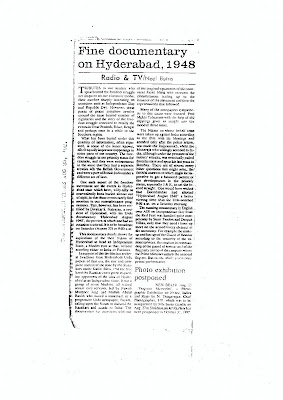 |
| From Fine documentary |
The Hindu, New Delhi explained to its readers, why it found the film, “ a viewer’s delight and a maker’s pride”.,
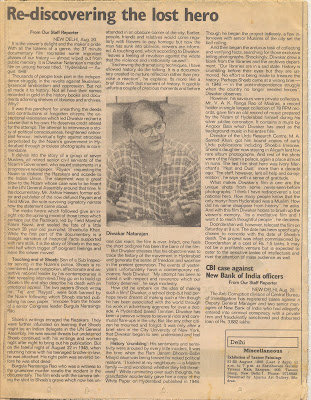 |
| From The Hindu, New Delhi Rediscovering The Lost Hero |
Nikhat Kazmi, in the Times of India, oracularly titled her piece, “The Trouble with Truth”.
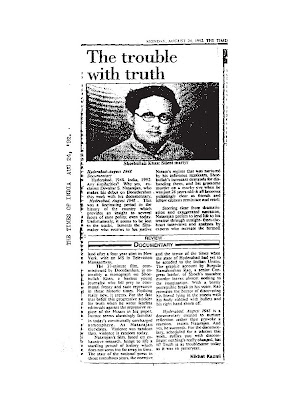 |
| From The Trouble With Truth Times of India |
The Indian Express,
 |
| From The Indian Express, Hyderabad |
The Pioneer,
 |
| From The Pioneer, New Delhi Of unknown fighters |
The Deccan Chronicle,
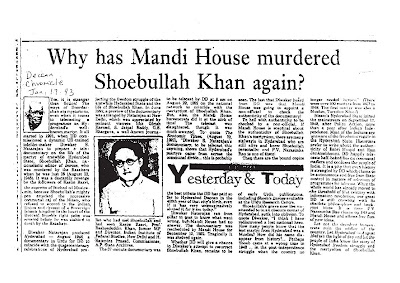 |
| From VH Desai Deccan Chronicle |
Siasat, Qaumi Awaz, all recognised the value of documenting an important aspect of our freedom struggle, which had been forgotten.
 |
| From VH Desai The Hindu Hyderabad |
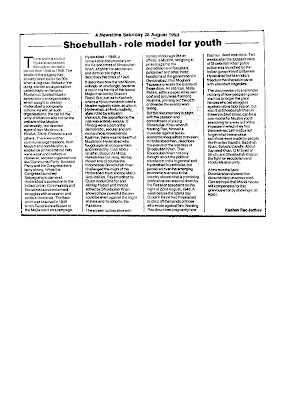 |
| From Newstime Hyderabad |
Among the most epiphanic reviews of my work was that by Dr Sanjaya Baru,appointed by the Prime Minister of India, Dr Manmohan Singh as his handpicked Media Adviser.
 |
| From Resurrecting History |
Freedom fighters who had known the late Shoebullah Khan, welcomed the film as
a significant contribution to the cause of communal understanding and harmony.
Kaloji Narayana Rao's Open Letter To Prime Minister Of India And Chief Minister, Andhra Pradesh
Historians of the calibre of Dr Bipan Chandra commended the painstaking attention to research, detail and documentation.
The Oral History Project of the Jawaharlal Museum and Library was alerted to record some of the forgotten heroes who had featured in the documentary.
The documentary had also been instrumental in my successful campaign for a Svatantra Senani pension for the martyr’s widow, under the Chairmanship of Dr Abid Hussain, with Dr Sanjaya Baru and several senior journalists as signatories, more than 40 years after his martyrdom.
Doordarshan’s response, triggered by the venality of some middle level officials and tolerated by the lethargy of higher ups, was unfortunately, a study in contrast.
* Doordarshan attempted to vandalise my work by asking for arbitrary cuts. It took me more than two years, most of which I had to spend in cheap hotels in Delhi, to get them to cease and desist.
* This experience bankrupted me. It was a body blow from which I have not yet recovered.
* The film was finally telecast without any cuts but abruptly and without any prior promotion or notice.
* When the film was finally telecast, it received only favourable attention, reinforcing the unconscionable nature of the delay.
* Requests from several responsible people, including Shri Atal Behari Vajpayee (then leader of opposition, Lok Sabha) and Padma Vibhushan Kaloji Narayana Rao, that the film be dubbed and displayed in other national languages were ignored.
* The documentary’s contribution to the cause of national history and communal harmony was not allowed any formal national recognition, awards, etc.
* Doordarshan lost the master tape containing the documentary.
* Finally, not only has Doordarshan not invited me for any projects in all these years, but has also truncated the concepts I presented and provided an unworkable and potentially calamitous pittance as budget.
On the 9th or 10th of September 1996 - around 5.30pm, the Commissioner of I & PR, Government of AP, informed me that the former CM Shri N Chandrababu Naidu was rushing to Bombay to collect funds for cyclone relief the following day and asked me whether I would be able to make a film to help the Hon’ble CM’s efforts.
Eager to be of service to the devastated people of the coastal regions of Andhra Pradesh, I accepted the challenge - and delivered.
Enthused by the extraordinarily positive results produced by my creative effort, the former CM (whom I had never met ) was thoughtful enough to call for me and to personally thank me.
In an interview to The Hindu recently, (April 4, 2003) the former Chief Minister has said that the 1994 cyclone was the first of the two "major" crises that he had faced in his tenure.
During that occasion, I took the opportunity to mention some of the problems I was experiencing with the Doordarshan management and requested his intervention and support.
The former Chief Minister agreed and wrote to then Minister of Information & Broadcasting Shri C M Ibrahim and later to Shri Jaipal Reddy (3-6- ’97)
 |
| From Hon'ble Cheif Minister of Andhra Pradesh Shri Chandrababu Naidu to Jaipal Reddy, Minister of Informa |
Despite the fact that Jaipal Reddy and the Home Minister Shri Indrajit Gupta had watched and had recorded their appreciation for “Hyderabad. August 1948.” nothing positive happened.
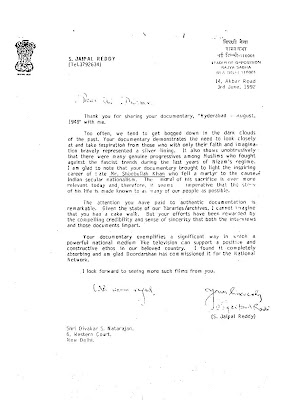 |
| From Shri Jaipal Reddy, Leader Of Opposition, Rajya Sabha |
 |
| From Shri Indrajit Gupta Ex Home Minister to Prime Minister Shri Atal Behari Vajpayee |
About a year after its non-response to the former CM’s recommendations, my various representations and article in the editor’s page of the Hindustan Times
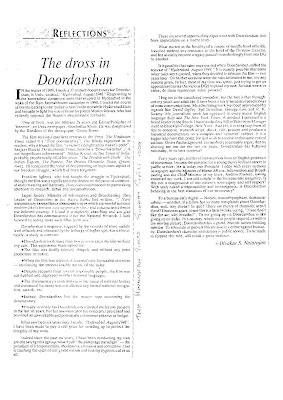 |
| From The Dross In Doordarshan |
and an op-ed article by the media correspondent of The Indian Express,Kavaree Bamzai
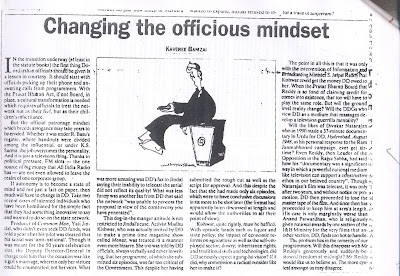 |
| From Kavaree Bamzai Indian Express |
DD sent me a notice for breach of contract on precisely the same issues contained in the former CM’s recommendations.
The prosecution/persecution on this matter (for a value of Rs 25,000/-) continues to this day.
The former CM wrote again (17-5-98) to Smt Sushma Swaraj, recommending that I be commissioned as “filmmaker of acknowledged eminence” to make films to commemorate the 50th anniversary of Indian Independence.
 |
| From AP CM to MIB |
He wrote once more to Smt Sushma Swaraj on 17-7-98.
 |
| From AP CM to MIB I |
In a welcome and unexpected affirmation of the documentary, “Hyderabad. August 1948”, the BJP advertised, “Our Martyr and Patriot Shoebullah Khan! The state of Hyderabad will not forget your sacrifice”. (The Deccan Chronicle 21-8-98.)
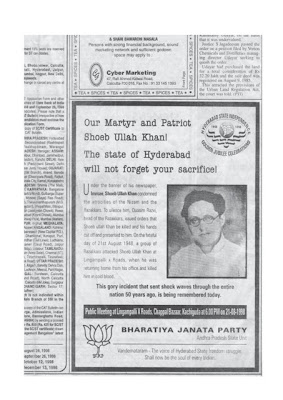 |
| From Sathyagraha |
Now the then state BJP president and Member of Parliament , Shri Ch Vidyasagar Rao, also endorsed the CM’s recommendations.(ltr dtd 10-9-98 to Smt Sushma Swaraj and Dtd 16 - 12 -98 to Shri Pramod Mahajan.)
In the absence of any results, I travelled to Delhi and could not find any of my papers on file.
Shri Yerrannaidu MP, several serving and past members of the NDA ministry, the Speaker of Lok Sabha, the late Shri GMC Balayogi and others revived the matter and requested that a favourable decision be taken “as a special case”.
This persuasion has not borne any positive result.
Some of the finest contemporary creative minds including Sarvashri Soumitra Chatterji, Shyam Benegal, Sanjay Leela Bhansali, Sidharth Kak, Om Puri, Jabbar Patel, Jahnu Baruah, Derek Malcolm, Jean Claude Carriere endorsed the former CM’s representations in a petition to the Prime Minister,
 |
| From Filmmakers petition to Hon'ble Prime Minister Shri Atal Behari Vajpayee |
India's editorial class did not support this petition.
Padma Vibhushan Shri Kaloji Narayana Rao (18-01-2001)wrote a moving open letter to the then Prime Minister Shri Atal Behari Vajpayee and the then Chief Minister of Andhra Pradesh, Shri Chandrababu Naidu.
India's editorial class, barring an honourable exception, saw it fit to censor this most distinguished call for justice.
The Confederation of Indian Industry - Southern region (July 13,2000), The Andhra Pradesh Union of Working Journalists, have all represented to the former Chief Minister on my behalf without any avail.
In October 2002, I met the PS to the former Governor of Andhra Pradesh seeking an appointment to meet the Governor.
After four months of meeting with this officer, almost thrice every week, I realised he had no intention of letting me meet the Governor.
I then met the Lady Governor at a concert and gave her a detailed petition.
I received an appointment the very next day. The former Governor gave me a most patient hearing. But nothing happened.
Last August I met the former Chief Minister, in his new capacity as Leader of Opposition, and showed him how his representations on my behalf had been well founded, reasonable, phenomenally popular and utterly ineffective.
He promptly shot off another letter to the Minister for Information & Broadcasting.
I am not aware of any response.
Prasar Bharathi’s conduct of the 50th year celebrations had been termed a , “50th year racket” by Sevanti Ninan , biographer of Shri N Chandrababu Naidu and media columnist of The Hindu. (August 9, 1998).
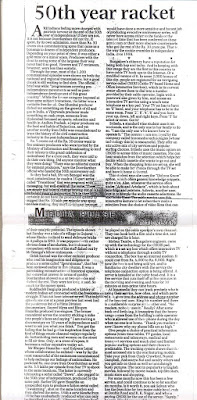 |
| From 50th year racket |
Other senior media columnists (Amita Malik, Indian Express) had similar views.
While my documentary was reasonably well reviewed, the editorial class has been strangely muted in responding to my unwillingness to submit to the "patronage paradigm".
I have personally met Sarvashri N Ram, Shekhar Gupta, Dilip Padgaonkar and several other colleagues in the media to explain my persecution.
It must be said that they have been unable to speak my truth to the powers that be.
| From The Indian Express makes Divakar S Natarajan a non person |
It has now been a decade since I responded productively to a serious crisis faced by the Government of Andhra Pradesh - at a moment’s notice and overnight.
Close to two decades - a life sentence - since my documentary earned national critical acclaim for having “brought to life” a forgotten but inspiring chapter in the history of the freedom struggle in Hyderabad and for having conveyed a measure of justice to some forgotten heroes.
The preposterous and bizarre non-implementation of the former CM’s repeatedly expressed and widely acclaimed recommendations has grossly violated my life.
Such an unrelenting perversity and egregious abuse of power has robbed me of the rewards and recognition that I have earned and deserve, arrested my professional development and blighted my personal growth, brought great anxiety and fear to my family, humiliated me and made me appear a dupe and a charlatan.
My Gulag type nightmare is an insult, threat and challenge to all those who would like to see India grow from a dependant, derivative and predatory system to a vibrant, autonomous, benign and productive force in the world.
For that reason, it demands a just and proper accounting.
PS: Please click on the pictures (thumbnails) to reach the full size version.
Thursday, October 16, 2008
A-tishoo, A-tishoo - the recurring plague of blind conformism
Pocketful of Posies
A-tishoo, a-tishoo
We all fall down !
Watched the financial news lately ?
Shoebullah Khan, Daniel Pearl and Us
Shoebullah Khan, editor of an influential Urdu language newspaper from Hyderabad, was shot dead and had his right palm severed by alleged goons of the Majlis E Ittehadul Muslimeen in Hyderabad, 1948.
Headquartered in Hyderabad, 'MIM' continues to function in its original name, as a critical coalition ally and consistently successful political party nursing national ambitions.
Shoebullah Khan had been 28 when he was murdered. Daniel Pearl 38.
Shoebullah Khan's second daughter was born a fortnight after his assassination.
Daniel Pearl's son was born three months after his murder.
Google "Shoebullah Khan" and you get less than twenty results. Google "Daniel Pearl" and you get close to a million.
Sunday, September 28, 2008
Prof Mushir Ul Hasan's Smart Move
In a land where thoughtful Hindus have to hold their noses against the President of a major national party baying for a hapless prisoner's blood – George Bush as Governor was dearly beloved and admired for such proclivity - Rajnath Singh screaming "When we come to power, we will make sure that Afzal is hanged" - please Rajnathji, so sooli mein chadao me for being a thayir sadam Tam Brahm - but I would rather know how you propose to rehabilitate the tens of thousands who have been uprooted by the devastating floods - Prof Mushir Ul Hasan's offer of extending legal aid to the students of Jamia accused of terrorism comes as a blessed whiff of sanity.
Finding quality legal advice in our democracy is about as easy as finding the Sanjeevani.
For twenty years, I've searched.
I've spoken to "Gandhian" journalists and "civil rights"type retired judges, MPs, MLAs and lawyers - not Shri Prashant Bhushan or Nandita Haksar - despite advice from some erstwhile good friends - entirely my fault - "altruistic" IT tycoons, professional associations and even scientists, I have hunted in Delhi and Hyderabad and Chennai and Bengalooru - but I have not found one good person who could have an intelligent conversation about the legal options I may have about getting accountability in my "no excuses," ultra-peaceful, non partisan, individual, sathyagraha against the patronage paradigm - the paradigm of shoddiness, irresponsibility, cronyism and corruption that is cretinising our great nation.
A sathyagraha for the idea of the rule of law, that is now in its, give or take a year or two, twentieth year.
I have been pettifogged thrice.
The one case that I can prove beyond any shadow of doubt - when the then Commissioner of Police and the then AP Governor's office connived and egged on the so-called Owner's Association to cut water supply to my flat, without any judicial intervention or authority - the Commissioner of Police blithely interpreting this vigilante mob action as a "civil" dispute - the gold medallist lawyer at least left behind a saucy Hindi phrase that will forever yield me lessons in humility - "aap bhi tho dhoodh ke dhule huve nahin ho".
Till date, I have to fetch and store water every alternate day.
If there are any Peter Russos in
Talking about Peter Russo, it just occurred to me that the sole forensic fraternization I have had on my case, was with a thirty something Australian backpacker in Pahar Ganj.
Over the tortuous years I invested, trying to get Doordarshan to be sane about working with me - with about as much success as Shri Ratan Tata had in Sonar Bangla - most of them spent in the halcyon climes of Main Bazaar, Paharganj,a Lonely Planet marked crossroads for Western backpackers and their suppliers, I had developed my own visa points system of those who would be worth my while.
In my system, "Readers of Books" topped the list. Ahead even of "Blondes wearing saris and pottu".
This guy, believe me, was really dug into "The Constitutional History of India"."If you really want to know a country, read its constitutional history." says he.
This one wanted to know.This was a brother.
Later as I became his guide and buddy, we visited his tabla teacher from DU who had accompanied my most illustrious aunt and when I confessed that I had been fatigued about writing about my plight, again and again and again and again and again and again and again and again and again and again and again and again and gain and again and again and again and again and again - okay, now think twenty years - he instigated me to demonstrate at the Film Festival in Delhi, helped draft my appeal, shared zany occult insights into deconstructing prose, and through my plain horror, explained with a relentlessly imaginative zeal how I had the soul of a punk rocker and bought me a marrow moving piece of our gorgeous tribal metal sculpture.
He pissed me off later by insisting on buying rare Indian paintings from Main Bazar, and I have not replied to him after he wrote to me complaining that the "art" he bought at some expense had washed off the cloth - but if he 's reading this, write me, man. I'm generous. I have forgiven you. Its divakarsnatarajan@gmail.com
Prof Hasan may not have the soul of a punk rocker, but he probably does have some of the Mahatma's shocking talent for doing the right thing.
It was probably said of the Mahatma that he could sight a moral high ground from a mile away and he never passed one without wanting to clamber on to the very top.
Prof Hasan has realised that its not right to let our children twist in the wind, while we hurry off to our date with the television studios.
Prof Hasan's gesture is "modern”, democratic, potent and exemplary.
Twenty years ago, when I had taken the final cut of my documentary, "
I had the opportunity of recalling the saga of the 28 year old Shoebullah Khan, editor of an Urdu newspaper Imroose who had been harassed, intimidated and finally slaughtered by the Razakars. They shot him dead and then cut off his right palm.
It is not for mere man to fathom the mysterious ways of Allah.
But here I was, a benighted and unredeemable qafir, chosen to be an awed witness to his mad / majestic munificence.
Because even before my niggles could develop into a concern, let alone take on the proportions of a worry, I was saved.
Prof MushirUl Hasan chose this particular moment to say some mildly professorial thing about Salman Rushdie’s comedy The Satanic Verses. And a bunch of Jamia Millia Islamia students chose to take deep umbrage and explode into a riot.
"Traitor to the qaum" screamed the students, to my relief and gratitude. They could have been quoting this rhetoric from my documentary. "Cut of his tongue. String him up. Shoot him down". They manhandled the poor man, demanded his resignation.
Decades ago, much before he became famous in
Can't argue with that, but then here was undeniable proof that Allah, certainly was no fundamentalist.
There were counter demonstrations in solidarity with the hapless academic. As a humble token of my own gratitude to the All Merciful Joker in the Ether With Perpetual Bad Timing, I joined them.
I called the Hassans and got myself invited to their refuge at the
Years later, when I was still struggling, and had organised a projection at the Andhra Pradesh Bhavan, which the then Home Minister the late Shri Indrajit Gupta, had kindly decided to grace, I invited them.
Unfortunately for me, they had already committed to the BBC, which was showing something about The Dynasty of the Nehrus - at a local five star hotel.
The Hassans were not the only people I met.
Saeed Naqvi spared time to watch my documentary. However he could not accept my offer to get on the documentary and introduce it with a context.
I met Shabnam Hashmi and the good folks at SAHMAT.
I met MJ Akbar when he was aide to the Hon'ble Arjun Singh. And on a few occasions since.
I was given the courtesy of writing in the editorial page in Hindustan Times. Kaveri Bamzai was generous to spare me a line in her light op-ed piece in the New Indian Express. Unfortunately, we did not inspire a single Indian to even write to the Editor.
I demonstrated through the entire duration of the Film Festival 10 -20 January 2000 in
Some of the finest and most respected folks present, took the time to talk to me, understand my effort and sign my petition addressed to the then Prime Minister.
The Press was present in numbers. Hasan Suroor was there. So was Nikhat Kazmi. The Press ignored me.
Javed Akhthar and Shabana Azmi had seen me at the Festival. Shri Akhthar did say hello. Coincidence: I had featured Ms Azmi's uncle the late Akhthar Hassan, in my documentary and had the opportunity to include her beautiful aunt and her gangly, bespectacled nephew, kinda reminded me of me at that age, in a frame.
Of course these were not the only people I met in our corroded capital city.
I would love to report that I made some intelligent, new friends who have been an oasis of inspiration and pillars of strength to me.
Unfortunately, I cannot.
Maybe these very busy people were too preoccupied to make the connection between the nationwide, 24/7 corruption and the pulverization of the idea of the rule of law or maybe it was just my strange sounding last name or my stubbornly khadi clad presence that spooked them - we just passed each other by.
C'est la vie.
Monday, February 25, 2008
Sorry Ms Farrow
Which made me squirm a bit about my careless slash at her.
I am sure you've read my blog Ms Farrow, and were tormented by this bit of unprovoked cruelty from a total stranger.
Sorry Ms Farrow.
Next time I'm in Manhattan, I'll buy you a pizza.
Friday, February 8, 2008
The Maharishi's Flower Power Rules !
Without the Beatles he would have been just another importuning Indian hairy.
A charlatan, who made a pass at Mia (Mia...who?) Farrow and was immortalized by John Lennon for his pains.
Slick marketeer, made a lot of money, but no difference.
This happened to me:
A few years ago, I was at a studio to transfer my documentary "Hyderabad. August 1948." to a DVD.
As I was about to review the result, a young man of medium height and regular features, invited himself and watched it with me.
He was there to do some post production work on some engineering movies. But he seemed keen to talk about my film. He did...with an insight and acuity that I found remarkable.
This kid's mind was pumping.
My documentary had been well reviewed in the Indian press...but none with the curiosity and closeness, that this otherwise unprepossessing young man had displayed.
No he did not have a background in Indian History... he had not studied Film.
He was an MBA he said, somewhat apologetically.
From where? Bangalore. Which school? From MIBS.
What was that? Maharishi International Business School.
Had I heard about it?
I had heard about the Maharishi and I asked him...did they teach any of that meditation stuff in the B school?
Of course, students had to meditate an hour every morning. He still did.
So that was the secret.
Unconsciously and quite apologetically, this youngster had developed the The Ever wakeful Third Eye of Consciousness.
Not the bored narcissistic eye. Nor the fearful Authoritarian Eye.
But the skeptical, compassionate, creative, disillusioning Third Eye.
The Eye that perceives the essence and the context.
The Eye that grasps the fleeting detail and the gentle interrogations within the obscured sub text.
This kid had it.
But like Harry Potter in Muggle world, he probably understood the burden of his gift of creativity and disturbance and wisely kept it hidden; even from himself.
I am a child of the late fifties and the office of Frank, Fearless Blitz, was just across the street from where we used to live in Bombay.
No question that there was a sense of Orientalist derision about the way we viewed ourselves those days.
The Blitz, the equivalent of the proliferating popcorn television of India today, had a great time sending up yogis.
The term "godmen" coined by Khushwant Singh for the Illustrated Weekly came much later.
The Sputnik went up, Yuri Gagarin came to India, we had our "temples of progress" and a certain lazy, cruel, Herodesque, "prove to me that you are no fool, walk across my swimming pool ... prove to me you're divine, change my water into wine...." kind of attitude to our deshi, India that is Bharat, selves.
But as we all know, there is no integrity to the palimpsest that is the Indian mind and underneath this terylene facade gushed a roaring deshi torrent.
Shri Umaprasad Mukherji, elder brother of Shri Shyama Prasad, visited us and I still remember walking him along with my Himalayan mountaineer uncle, to some place near Azad Maidan.
Swami Sivananda, Ramana Maharishi, Kanchi Periyaval were all regulars in my Nani's chats with me.
And we were completely immersed in our music.
Ustad Ghulam Mustafa Khan sa'ab regularly came home, to teach Nani, both in Kanpur and Bombay and I was ordered to hang around.
The Guru who lived closest to us was Shri Mukthananda at Ganeshpuri and even though I have no doubt he took a personal liking to me, I was a very verbal six, the legend is that he prophesied I would be a judge one day, my own joy came from the hot, sulphurous springs at Vajreshvari and the anticipation of watching the deer that roamed his ashram.
Years later, Nani dragged me off to Guru Purnima at Ganeshpuri.
Even as I waited for the prasad, they rang the bell to start meditation. I took my place on a platform under a great tree, went into a deep snooze and woke up when they rang the bell again.
Looked around and sitting next to me, deep in meditation was Nargis Dutt. Her brood came in a little later all dressed in their Guru Purnima best.
Sunjay Dutt was much shorter than me and was in a little three piece suit and bow tie!
What do I think of Sunjay Dutt?
Like most Indians and the Kanchi Sankaracharya, a victim of a corrupt Indian state and political system .
The Kanchi Periyaval and Chinna Periyaval had allowed me to sit very close to them over several years - The Elder had started our exchange by offering to teach me a mantra, that would enable me to see the next day - the very thought that they would be involved in violence is laughable.
If I had a chance, I would hug, cry and condole with each person who suffered in Mumbai, Gujarat, Punjab, Kashmir, Pakistan, Afghanistan, Iraq, the Middle East, the West and all the gorgeous animals and forests .
The Maharishi did immensely more than that of course.
On the few occasions that my service provider offered the Maharishi channel, I was delighted to find him and his disciples to be well informed, trenchant and unflagging critics of the West.
They questioned Western dogma. They insistently opposed the war on Iraq.
But their challenge like the Mahatma before them was loving and they offered a tried and tested alternative.
So it is noticeable, how the Western Press and the dalal press in India chose to confine the Maharishi in a time warp...outside the context of its massive recent and current insanities.
The Maharishi's flower power survived the hippies and the Soviet Union. He did not instigate a "cultural Revolution" nor did he sow any killing fields.
I f ones values are truly sane and life centred, it is clear that this giggly, hairy man has towered over the so called leaders of the so called free and other worlds.
To the best of my knowledge, none of his actions resulted in the loss of any life.
The Maharishi was an adventurer who makes Columbus look like a klutz.
The Maharishi was not a batty charlatan, nor was he a flaky evangelist. He was no "parasite".
He was an angry, impatient bodhisatva, who transformed lives; and I believe could have cooled our fevers.
He is what I may have been, if I had transcended my addiction to nicotine and aversion to walking as a form of physical exercise.
He is what nations may yet be, if they transcend their fascination for the wrecking ball.
The Financial Times UK can have the last word:
"To die leaving a multi-million-dollar global business empire is an achievement. To do so while countless devotees still regard you as a spiritual leader is about as likely as Yogic flying. The Maharishi Mahesh Yogi, guru to the Beatles, pulled it off. His legacy – beyond the mundane $2bn his estate is reckoned to be worth – is a treasure-trove of tips for management success."
Sunday, February 3, 2008
RTI For Babus too!
The Central Information Commission is "busy playing agony aunt" to a score (sic) of babus 'whining"(sic) over various promotional and compensation matters.
Quoting "insiders" on this "trend in babudom"(sic) he says "many bureaucrats are now actually using the RTI Act for their own personal vested interest".
"Ranging from scrutinising file details when superseded to "petty" complaints on out of turn allotment of houses, these complaints make up an "alarming" 40% of the ones received by the CIC.
"No wonder" commiserates Cherian, Wajahat Habibullah, Chief Information Commissioner is "worried" about the backlog, as it is already dealing with a huge- one of more than 12,000 second appeals by "citizens".
Cherian then names a few a babus, who according to him have committed the heinous, unpardonable act of demanding their rights under the law and I do not know any of them, in fact I do not know another soul who has used the RTI.
As somebody who has been at the receiving end of serial babu bellicosity since the last twenty years, I ought to find this news appealing.
I find it appalling.
Because in typical "babu" fashion, this snippet of PR cleverness, diverts our attention from the real culprits, PIOs who appear to be hoarding simple, innocuous information that may be necessary to the appellants for the dignified conduct of their daily life and misdirects our indignation on the hapless victims who have been recalled to be skewered in public.
Is it possible that these vilified babus are actually the orphans? Those currently orphaned without a powerful sugar daddy?
But they are also citizens, entitled to the full protection and succor of the law.
To label any group,vilify them and strip them of their rights and dignity is... not cool.
The piece makes another diabolical Catch 22 distinction.
Between "private" and so called "public" interest .
So, now, you can deny information because it constitutes mere individual interest...and also because it might compromise the glorious national interest.
Is "private interest" such a shameful and socially undesirable disease? Does our Constitution only permit "thekedars" of the public interest to exist?
So,who's manufacturing the backlog of second appeals?
Is it the hapless petitioner or the callous appellate authority protecting "vested interests",patrons and mafioso types?
Shovel it out , I say.
If that's what it takes to unshackle our babus from the choke hold of the mafioso types.
And what value are the appellate authorities adding?
Would it not be more rational and productive, for the Commissioners to wield their powers like a hot cleaver to smite the dysfunctional appellate authorities who refuse to "apply their minds" to protect the Law?
Do that Sarvashri Commissioners and watch the backlog -12,000? Such a big deal? In a nation of a billion citizens ? In the Land of the Rising IT Sun?- melt away.